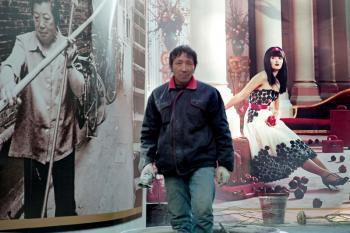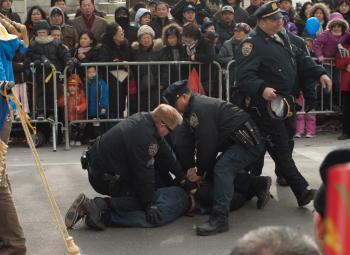[youtube]0vx5afAtGAY[/youtube] Large Scale Organ Harvesting in ChinaEach year 1.5 million people in China need an organ transplant, but no one wants to donate. This was shown in a recent study reported by the Yangtse Evening Post. After one year, a pilot organ donation program in Nanjing City found zero volunteers.
The Feb. 24 piece in the Post said Nanjing was one of the ten cities chosen for the 2010 pilot because of its rapidly expanding population of 6.3 million. Not only were there no takers last year, but over the past 20 years there were only three voluntary donations, the article said.
Beijing Evening News also reported in August 2009: “According to incomplete statistics, since the first organ donations in 2003, there were only 131 organ donations from those who passed away between 2003 and May, 2009.”
The Yangtse Evening Post listed several examples to indicate that the major obstacles to organ donations are caused by traditional Chinese customs and mentality.
One example is a male migrant worker who died last October of a cerebral hemorrhage. The man’s organs were in good condition, but he had not consented to donate them, and the family was unavailable to give consent in time.
Red Cross experts in Jiangsu Province told Yangzi Evening News that with the American model, when applying for a driver’s license one can indicate one’s willingness to donate the body in case of sudden death. But long-held cultural mores make Chinese are unwilling to donate any part of their bodies. Car accidents are particularly taboo: asking questions about death and organ donation before getting a driver’s license is considered unlucky.
Another example raised in the report was a woman from the Yangzhou countryside who became sick and was willing to donate her organs. But her parents firmly opposed it and brought her body back to her hometown.
According to Chen Shi, director of the Society of Transplantation of China Medical Association, by the end of 2005 China had conducted over 74,000 kidney transplants, over 10,000 liver transplants, and over 4,000 heart transplants.
But there are higher numbers floating around, too. Zheng Shusen, president of First Affiliated Hospital of Zhejiang University School of Medicine and member of the Chinese Academy of Engineering, said in September 2008 at a conference that, “There have been 140,000 liver transplant recipients that are able to continue with their lives because of receiving liver transplantation, with an increase of 10,000 more transplants done each year.”
Chinese authorities have told different stories about where the organs come from, too. As early as 30 years ago Chinese doctors testified at the United Nations that regime authorities stole the organs of executed prisoners. The Chinese Foreign Ministry denied this.
In July 2005, China’s Vice Minister of Ministry of Health Huang Jiefu admitted for the first time at the World Liver Transplant conference that most transplanted organs in China come from executed prisoners.
According to Amnesty International at least 1,718 people were executed in China in 2008, a number far less than the number of organ transplants.
More grisly explanations have come forth. In mid-2006 an investigation by former Canadian parliamentarian David Kilgour and human rights lawyer David Matas concluded that the bulk of organ transplants in China were due to the harvesting of organs from Falun Gong prisoners of conscience. If true, the allegations would be “a form of evil we have yet to see on this planet,” they said.
In their investigation they note that the source of organs for 41,500 transplants for the six year period 2000 to 2005 is unexplained by official data, and that the only possible explanation is that the organs were harvested from Falun Gong practitioners.
The UN has asked the Chinese authorities to respond to the allegations, but no substantive response has been forthcoming.
Read the original Chinese article.
The Feb. 24 piece in the Post said Nanjing was one of the ten cities chosen for the 2010 pilot because of its rapidly expanding population of 6.3 million. Not only were there no takers last year, but over the past 20 years there were only three voluntary donations, the article said.
Beijing Evening News also reported in August 2009: “According to incomplete statistics, since the first organ donations in 2003, there were only 131 organ donations from those who passed away between 2003 and May, 2009.”
Major Obstacle
The Yangtse Evening Post listed several examples to indicate that the major obstacles to organ donations are caused by traditional Chinese customs and mentality.
One example is a male migrant worker who died last October of a cerebral hemorrhage. The man’s organs were in good condition, but he had not consented to donate them, and the family was unavailable to give consent in time.
Red Cross experts in Jiangsu Province told Yangzi Evening News that with the American model, when applying for a driver’s license one can indicate one’s willingness to donate the body in case of sudden death. But long-held cultural mores make Chinese are unwilling to donate any part of their bodies. Car accidents are particularly taboo: asking questions about death and organ donation before getting a driver’s license is considered unlucky.
Another example raised in the report was a woman from the Yangzhou countryside who became sick and was willing to donate her organs. But her parents firmly opposed it and brought her body back to her hometown.
Source of Organs
According to Chen Shi, director of the Society of Transplantation of China Medical Association, by the end of 2005 China had conducted over 74,000 kidney transplants, over 10,000 liver transplants, and over 4,000 heart transplants.
But there are higher numbers floating around, too. Zheng Shusen, president of First Affiliated Hospital of Zhejiang University School of Medicine and member of the Chinese Academy of Engineering, said in September 2008 at a conference that, “There have been 140,000 liver transplant recipients that are able to continue with their lives because of receiving liver transplantation, with an increase of 10,000 more transplants done each year.”
Chinese authorities have told different stories about where the organs come from, too. As early as 30 years ago Chinese doctors testified at the United Nations that regime authorities stole the organs of executed prisoners. The Chinese Foreign Ministry denied this.
In July 2005, China’s Vice Minister of Ministry of Health Huang Jiefu admitted for the first time at the World Liver Transplant conference that most transplanted organs in China come from executed prisoners.
According to Amnesty International at least 1,718 people were executed in China in 2008, a number far less than the number of organ transplants.
More grisly explanations have come forth. In mid-2006 an investigation by former Canadian parliamentarian David Kilgour and human rights lawyer David Matas concluded that the bulk of organ transplants in China were due to the harvesting of organs from Falun Gong prisoners of conscience. If true, the allegations would be “a form of evil we have yet to see on this planet,” they said.
In their investigation they note that the source of organs for 41,500 transplants for the six year period 2000 to 2005 is unexplained by official data, and that the only possible explanation is that the organs were harvested from Falun Gong practitioners.
The UN has asked the Chinese authorities to respond to the allegations, but no substantive response has been forthcoming.
Read the original Chinese article.


